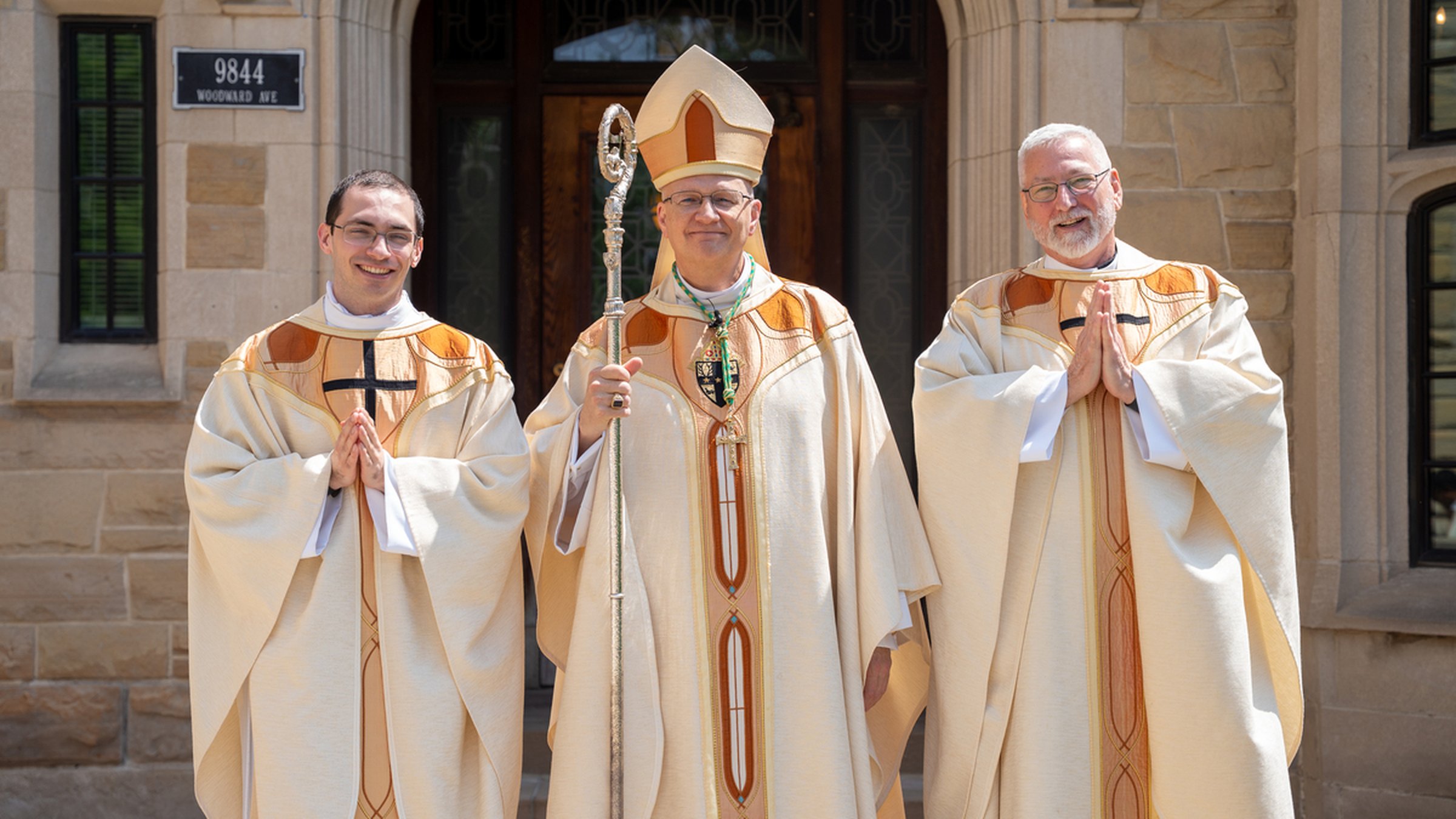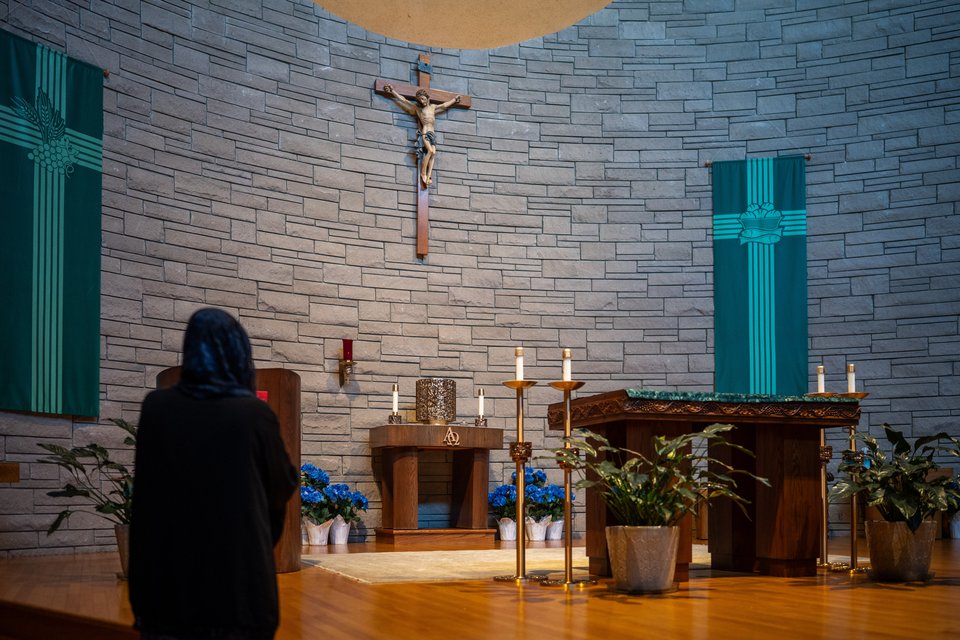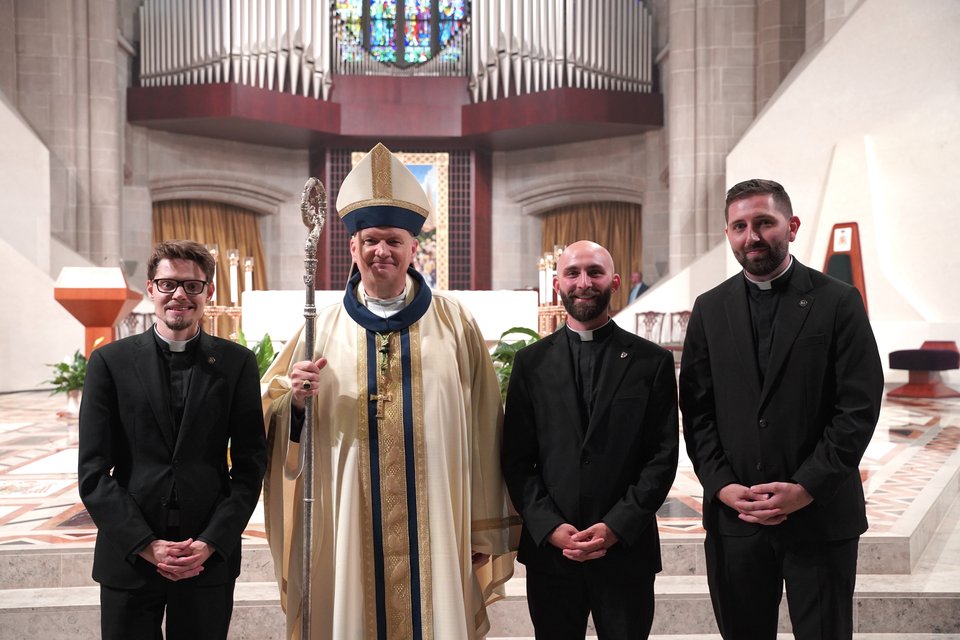Encouraging two men to embrace their new vocation, Archbishop Weisenburger advises new priests to pursue lives of faithfulness
DETROIT — On the morning of June 7, two men entered the Cathedral of the Most Blessed Sacrament as deacons. They left as priests “now and forever, in the order of Melchizedek.”
Fr. Pat Bruen, 67, and Fr. Benjamin Schroder, 26, were ordained to the priesthood by Detroit Archbishop Edward J. Weisenburger, the culmination of many years of prayer, discernment, study and formation.
It was a tremendous day for the two men and the whole Church.
“Obviously, it is a great joy to be here, and to state the obvious, it is a joyful day for our entire archdiocese. For you to bear witness to a vocation to priestly ministry is an encouragement to your brother priests, to those seminarians with whom you have been journeying in recent years, and to other men who likewise might be considering a priestly vocation,” Archbishop Weisenburger told the two men.
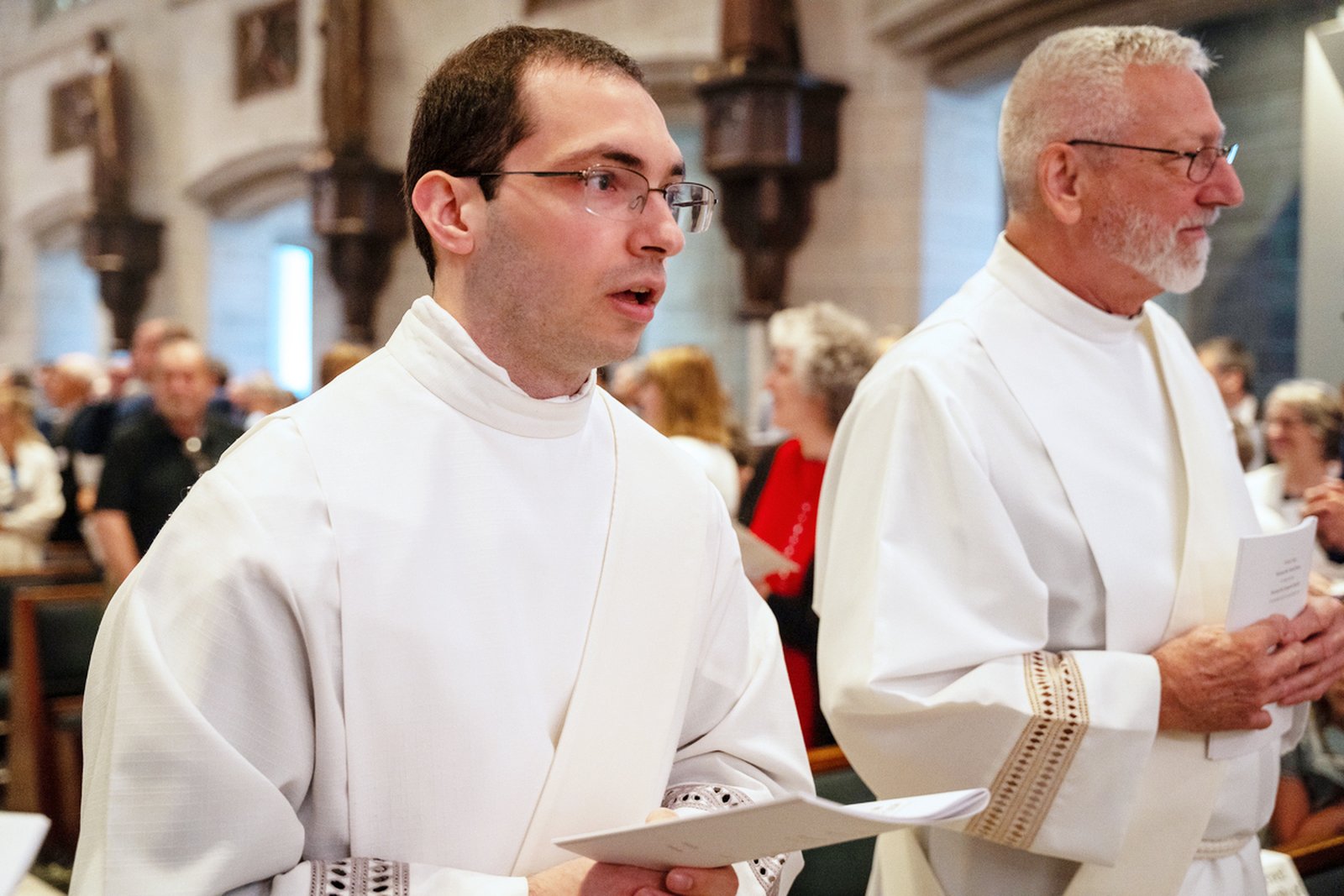
The ordination rite began with the election of the candidates, with Fr. Stephen Burr, rector of Sacred Heart Major Seminary, presenting Deacons Bruen and Schroder for ordination. The archbishop accepted the recommendation to the assembly's applause.
Archbishop Weisenburger then delivered his homily, focusing on two key promises both men were about to make to God, the archbishop and the entire Church.
“Now, while there are actually several promises a man makes along the way to priestly ordination, there are two lifelong vows,” Archbishop Weisenburger said, “promises made to God, accepted by your bishop. They give a primary structure to your lives in ministry. They are, of course, celibacy and obedience. I’d like just to say a few words on each, and I’ll begin with the much easier of the two vows: celibacy."
Archbishop Weisenburger cautioned the two men not to think of celibacy as a condition of solitude that draws one closer to God, but instead to think of it as a means to be better interwoven into the world.
“You might say celibate men are alone in our perfection with God; I hope by now you know that nothing could be more ridiculous or untrue,” Archbishop Weisenburger said. “Indeed, there’s nothing particularly virtuous about isolating ourselves from human interaction, the very bonds of friendship that help others see Christ in us.”
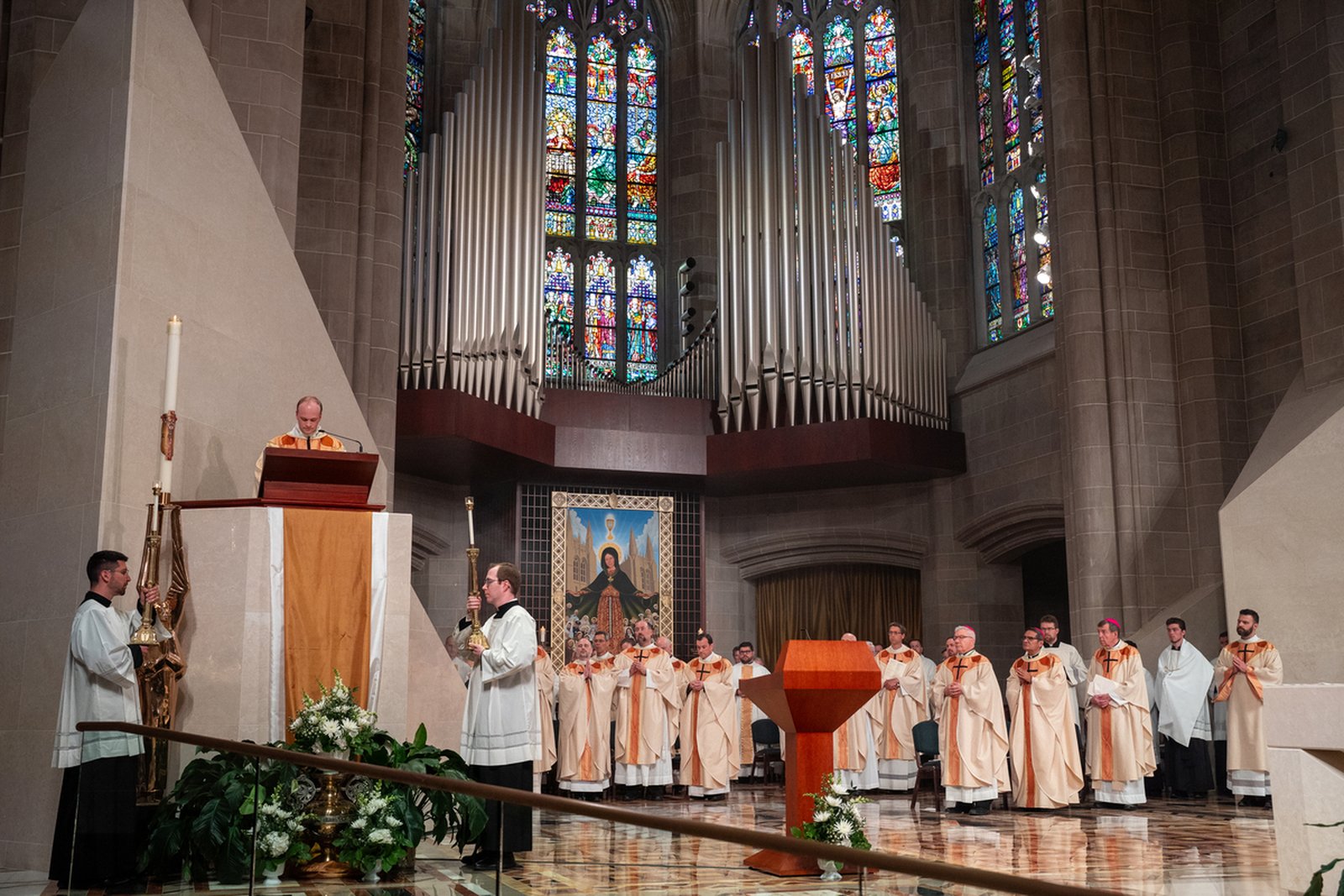
Archbishop Weisenburger quoted several scholars throughout Church history who reflected on the tremendous gift celibacy is, and how many saints, through their celibate lives, sanctified the lives of the people they encountered.
It is through these encounters and the fostering of profound relationships that a minister of the Gospel can live a rich life through celibacy, the archbishop said.
“Joyful and successful ministers of God always and without exception have strong peer relationships, deep relationships with people you don’t have to mince words with, people who will support you no matter what, even when they’re confronting you,” Archbishop Weisenburger said. “Maybe I’m a little too sobering on such a joyful day. But one thing I’ll promise you: You will not survive this era in Church history without sharing your lives deeply with such brother priests who will be your friends, and you for them.”
The archbishop told the two men to pour out their lives into the people they would meet along their journeys in priestly life, and they would have richer lives.
“Good. Now for the really hard one: obedience,” the archbishop continued. “That line might surprise some of us; it shouldn’t. In a culture that espouses absolute and unquestioned personal freedoms, the idea of placing our fate in the hands of another appears nothing short of psychotic to our culture, and thus, again, the wonderful opportunity to be prophetic.”
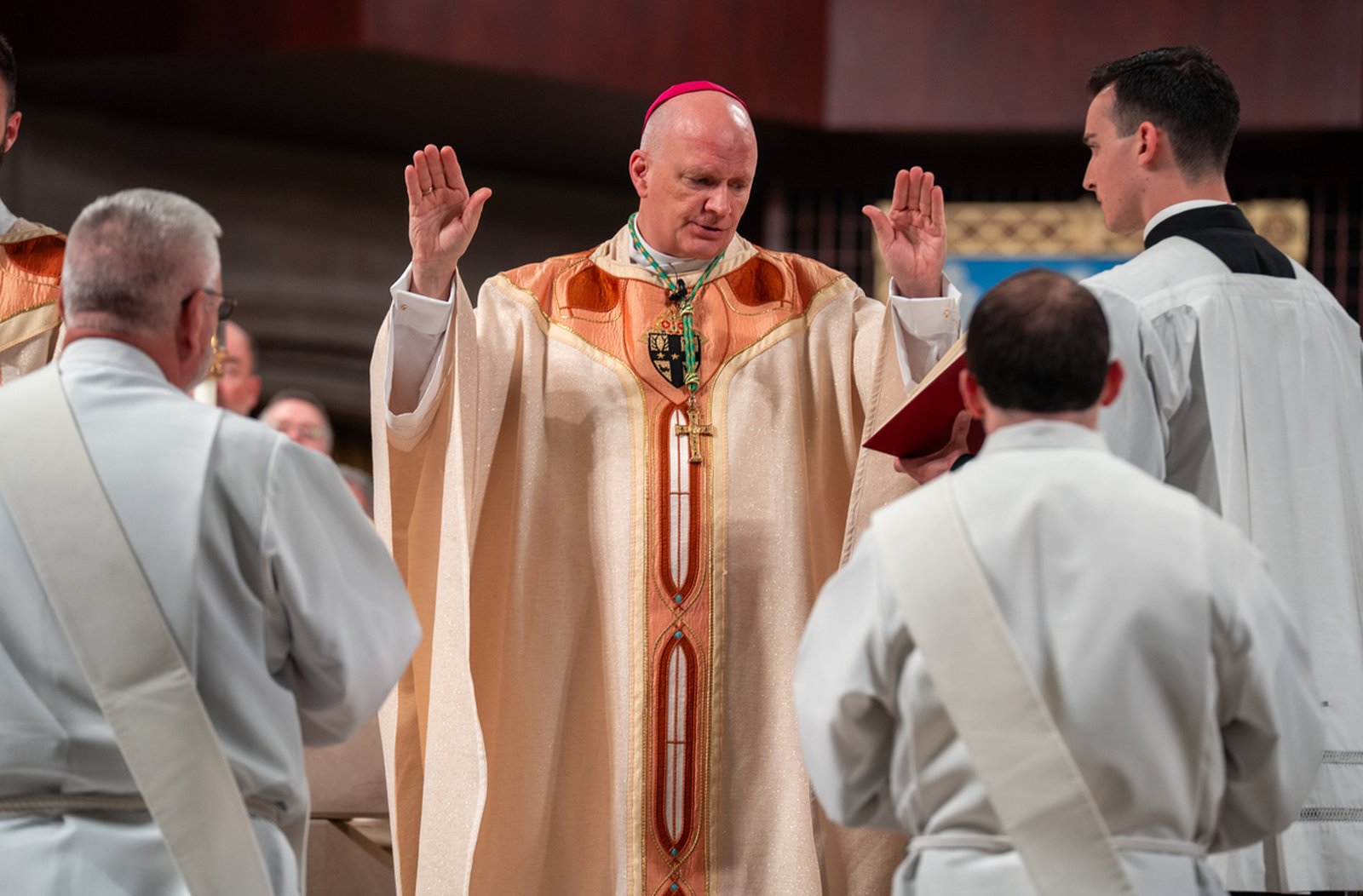
The archbishop pointed to moments in the Church’s history when obedience gave way to division and frustration in the Church, all stemming from a lack of obedience.
Archbishop Weisenburger admitted that there are moments in every priest’s life when obedience is challenging, abandoning oneself to the needs of the Church.
“In fact, I doubt there’s a priest sitting anywhere in this cathedral today who has not been called to a task he did not want or felt burdened by an obligation that belonged better in his mind to others, or that the archbishop was completely out of his mind in asking him to do something,” Archbishop Weisenburger said. “But after a lengthy two months in this archdiocese, my firm conclusion is that the men sitting in this cathedral with you are the very ones who have persevered, who not only gave voice to nice sentiments at their ordination, but they've lived the words they spoke.
“As you take a profound step toward joining this noble presbyterate along with all those who have preceded us in this archdiocese, add to their strength by committing to God your own heartfelt determination to a life of equal and charitable obedience.”
The archbishop concluded his homily by asking then-Deacons Bruen and Schroder to resist the temptation to to take a “spiritual holiday” by taking their lives back into their own hands.
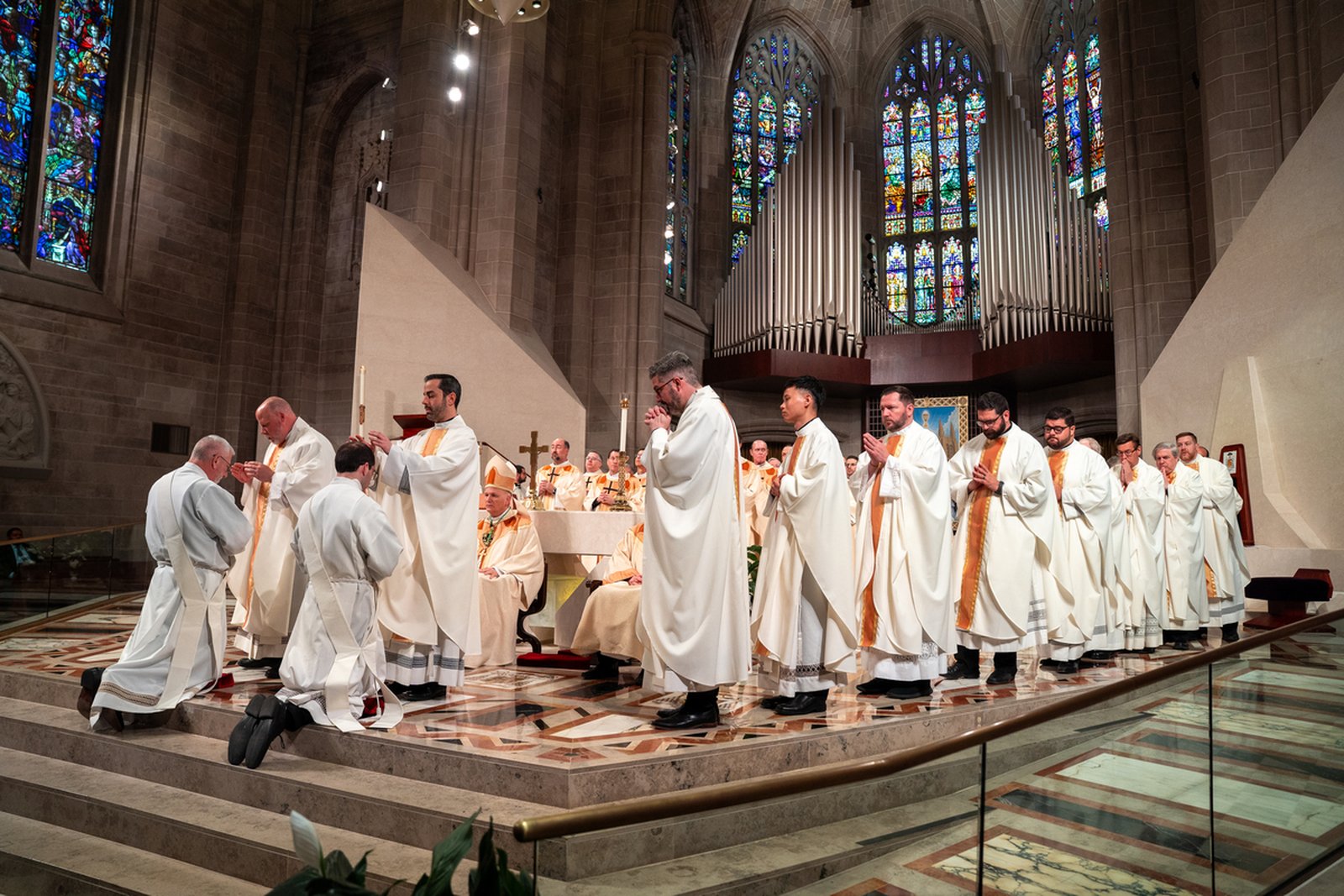
“So, Ben and Pat, if your discernment has brought you to the point that you hear God calling you to priesthood — priesthood within the framework of these two great vows — then prepare yourself to step forward now,” Archbishop Weisenburger said.
After both men made their promises, the cathedral choir sang the Litany of Supplication while the candidates prostrated themselves before the altar.
Archbishop Weisenburger laid his hands upon the two men in prayer, followed by all the priests present, as the assembly sang “Veni Sancte Spiritus,” asking for the intercession of the Holy Spirit.
The newly ordained priests were vested by their brother priests; Fr. Bruen by Fr. Robert McCabe, and Fr. Schroder by Frs. Paul Snyder and Joseph Kirkconnell.
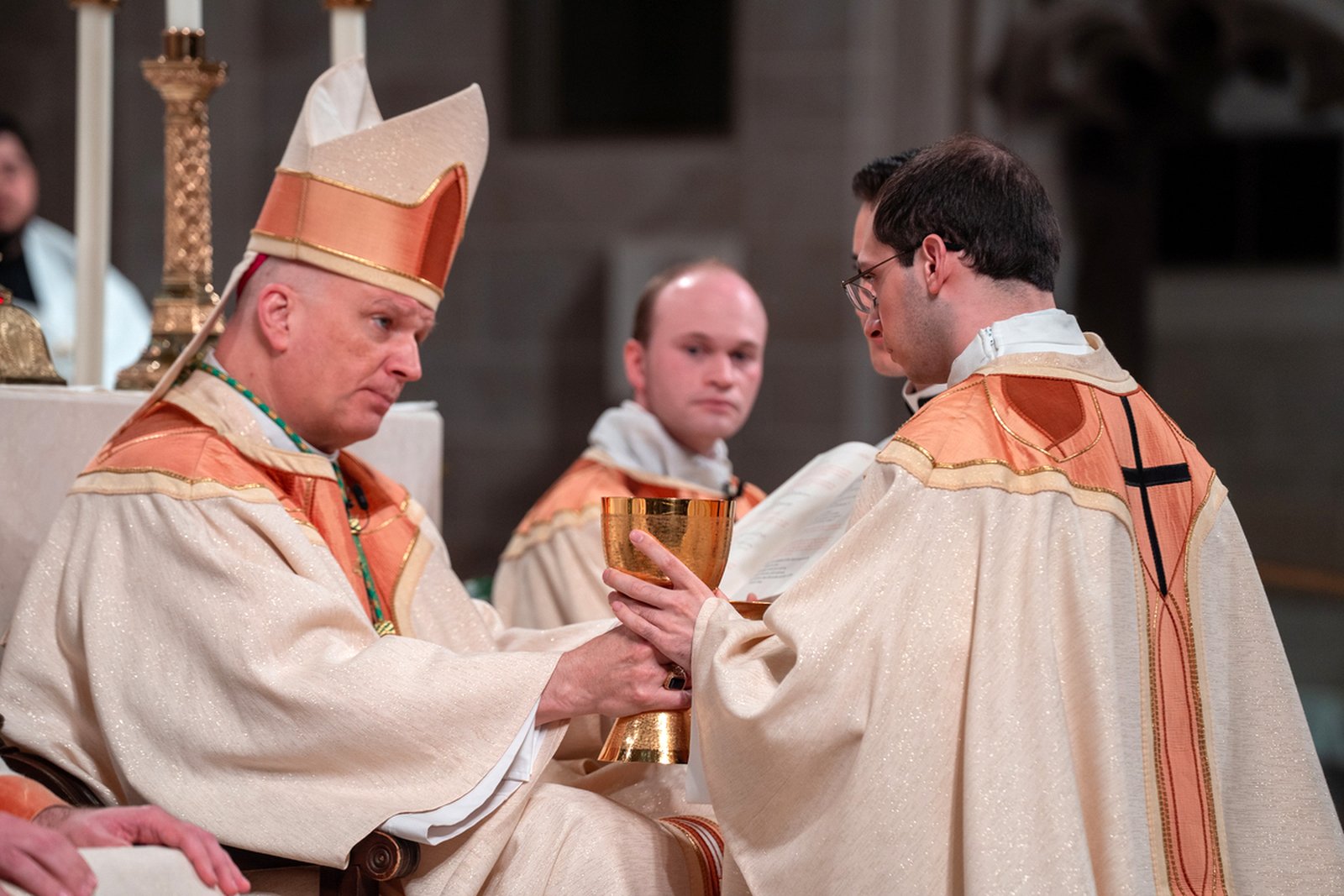
Archbishop Weisenburger then anointed the hands of Frs. Bruen and Schroder, saying, “May the Lord Jesus Christ, whom the Father anointed with the Holy Spirit and power, guard and preserve you, that you may sanctify the Christian people and offer sacrifice to God.”
Members of the faithful then brought forth a paten holding the bread and a chalice containing the wine for the celebration of the Mass. The bread and wine were handed to a deacon, who in turn passed them on to the archbishop, who presented them to Detroit’s newest priests.
“Receive the oblation of the holy people to be offered to God,” Archbishop Weisenburger said. “Understand what you will do, imitate what you will celebrate, and conform your life to the mystery of the Lord’s Cross.”
Archbishop Weisenburger gave each of the newly ordained a fraternal kiss, followed by all the other priests gathered, as the Mass progressed to the Liturgy of the Eucharist.
New priests offer thanks
Fr. Bruen delivered an address of thanksgiving at the end of Mass on behalf of himself and Fr. Schroder, thanking their parents, family, teachers and mentors along their journey.
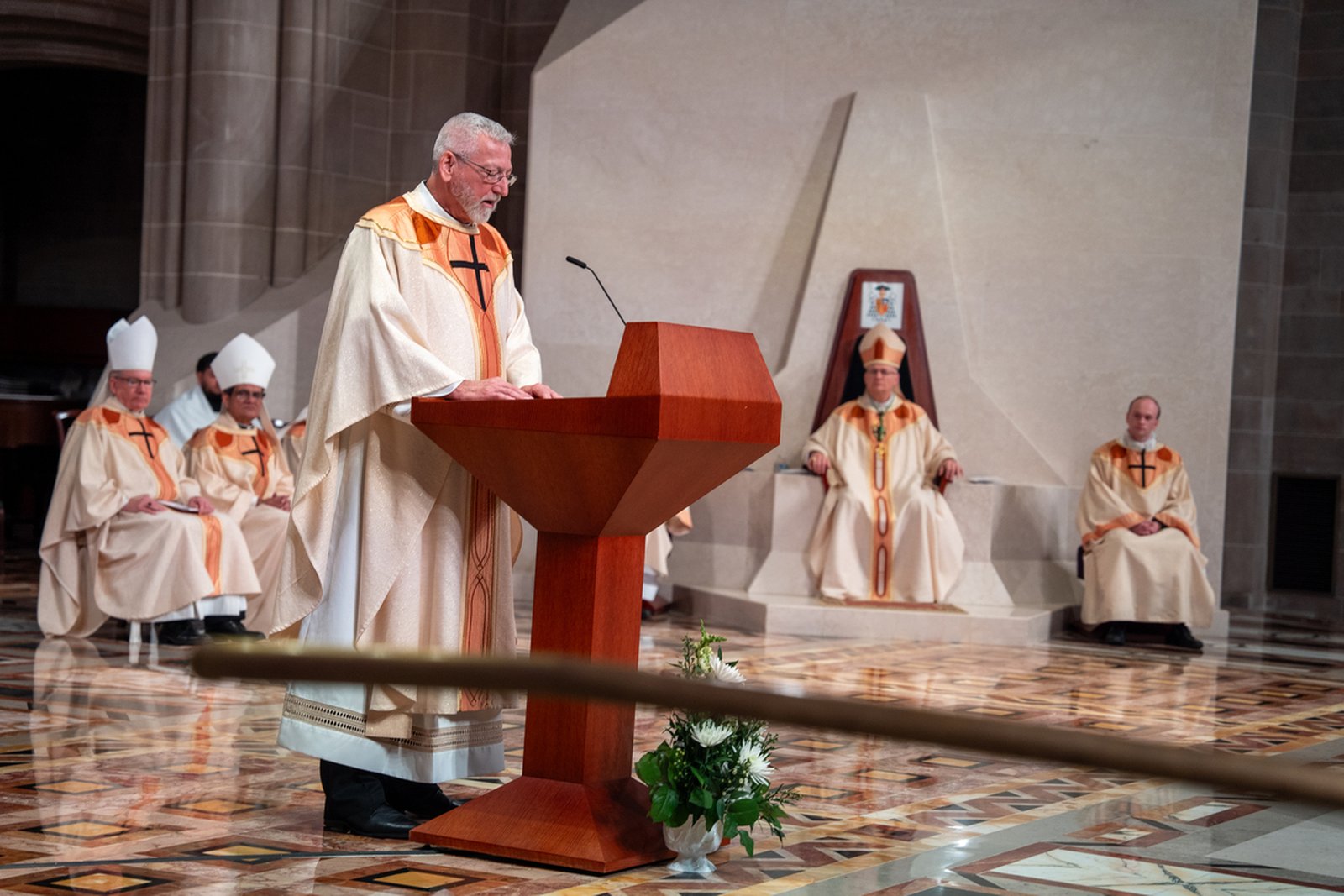
Fr. Bruen, 67, a graduate of Pope St. John XXIII National Seminary in Weston, Mass., and Fr. Schroder, 26, a graduate of Sacred Heart Major Seminary in Detroit, took two different paths to the priesthood, but are now forever united in priestly ordination, Fr. Bruen said.
“On the surface, Ben and I look and are very different,” Fr. Bruen said. “In many ways, our formation, both formal and practical, has come from different directions. Our life experiences may have been different, but in many important ways, we are the same. We are both trying to live in accordance with God’s plan for us. What we have in common is that we have come to understand by giving ourselves to the Lord, we become more of who we are for His greater glory.”
Fr. Bruen thanked former Detroit Archbishop Allen H. Vigneron and Archbishop Weisenburger, “the one who welcomed us in and the one who is sending us out,” for their leadership of the Archdiocese of Detroit, as well as the many people along their journeys who have shaped them into the priests they are today.
“Thanks to the efforts of countless people, we are ready to be priests,” Fr. Bruen said, “but most of all, because of the Holy Spirit that fills us now. Most importantly, then, our gratitude and everything else we have go to God. So thank you, Jesus.”
Detroit Catholic spoke with family of the ordained after Mass, who witnessed the people they love answer God’s call.
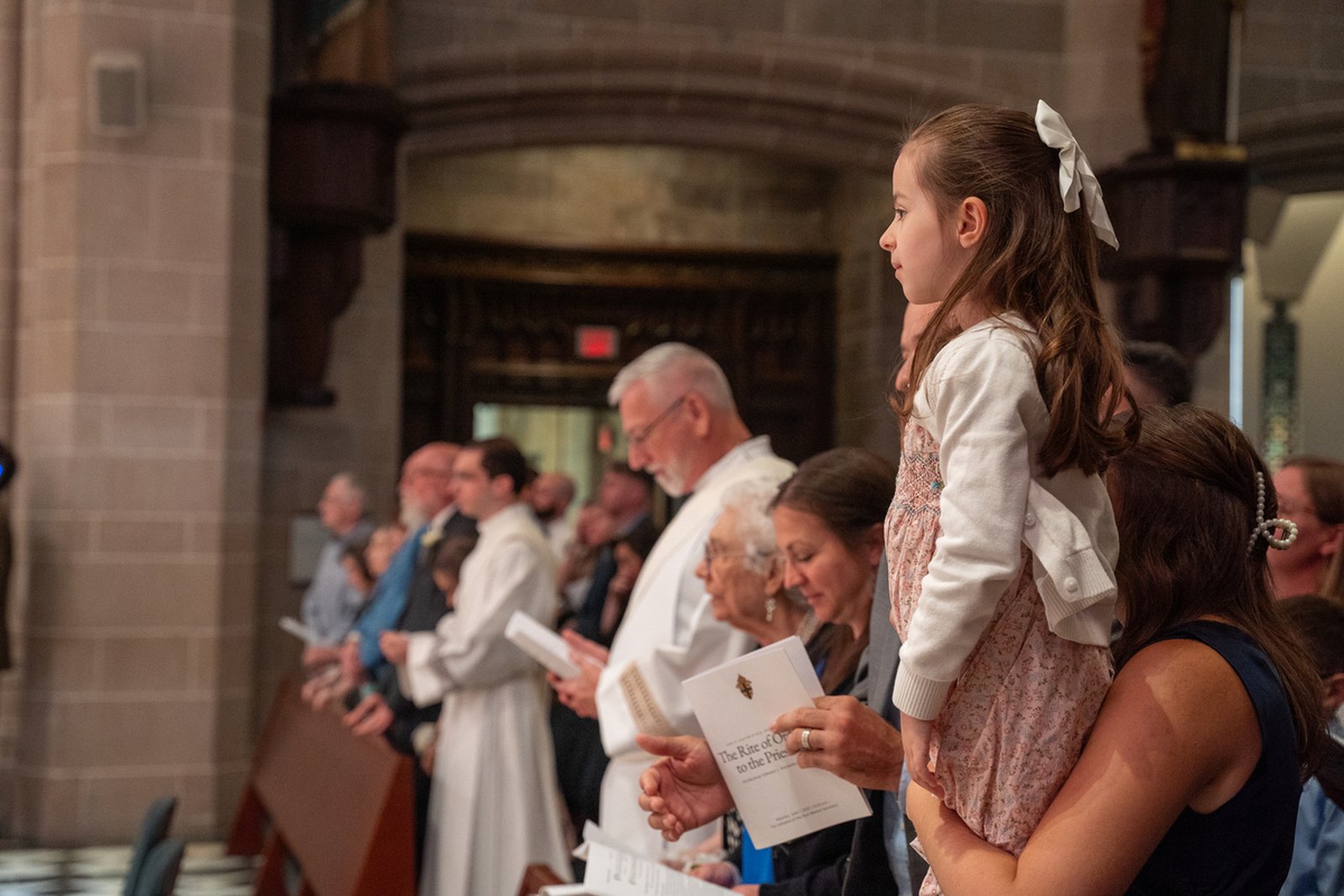
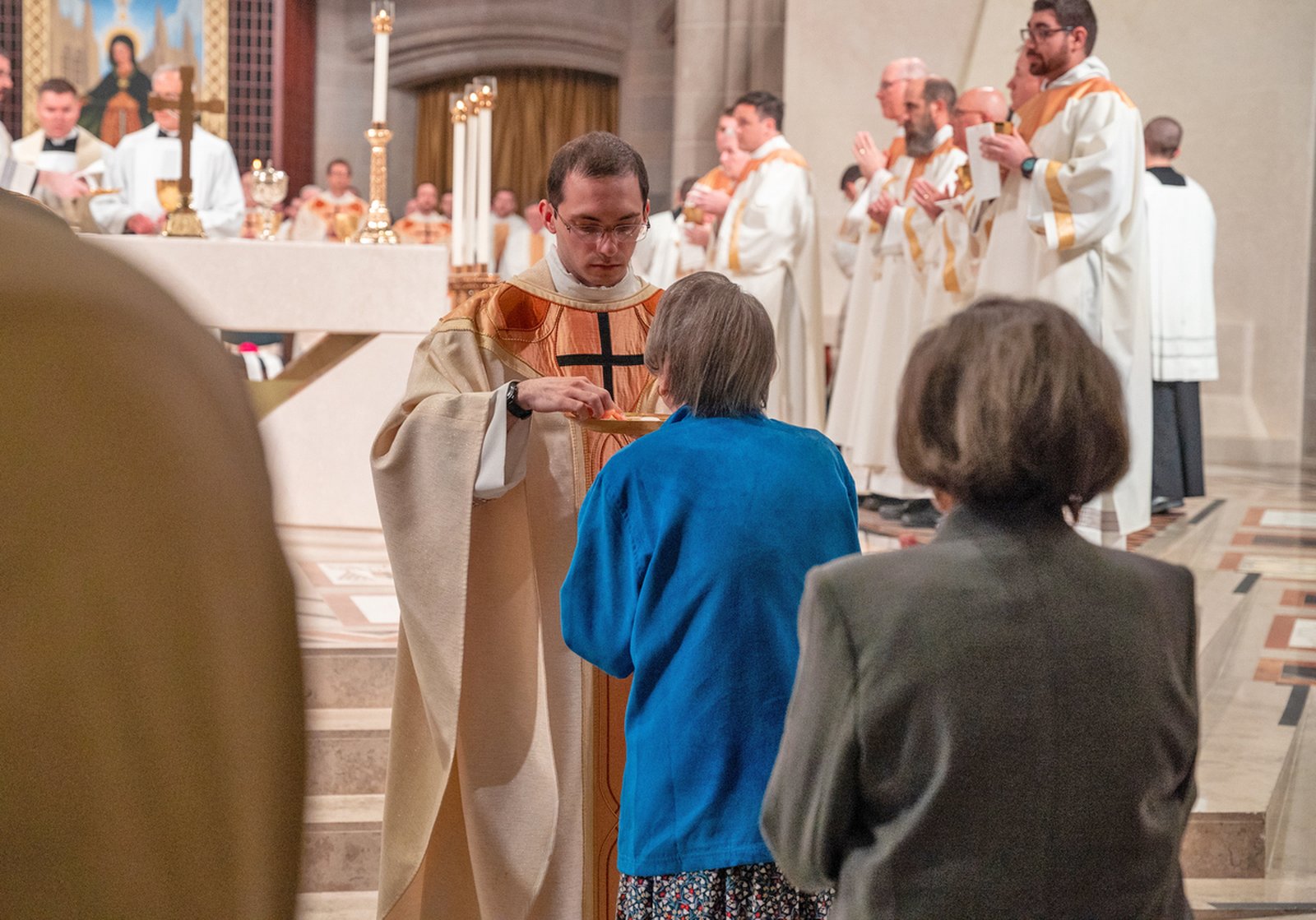
“I can’t take it in quite yet,” said Randy Schroder, father of Fr. Schroder. “He was very young when he first considered the priesthood, and then, of course, more seriously about 10 years ago in high school. He started going to Sacred Heart, thinking he might teach, so he didn’t come down right away and say he wanted to be a priest. Then, after a couple of years, he said, ‘I think I’m being called this way.’”
“He grew so much during formation,” added Karen Schroder, Fr. Schroder’s mother. “He grew closer to God. He liked all the things he was learning, all the theology, all the Scriptures, all the different languages. So when he said, 'I’m going to become a priest,' I don’t think it surprised me.”
Kely Franzonello and her two brothers had a rather unique perspective in the Catholic Church, watching their father become “Father.”
Fr. Bruen began discerning the priesthood after his wife of 41 years, Georgiana, died in 2020.
“My mother was very ill for years, and he was her caregiver, and I think he just has the heart of a servant,” Franzonello said. “When she passed away, he just didn’t even know what to do with himself, and I feel like this is his way of continuing to serve. Instead of serving his wife, he’s going to serve a parish and the Church and Jesus.”
“He’s well-spoken and he loves the Church, he loves God, so I think he can’t go wrong with those characteristics,” said Patrick Bruen, Fr. Bruen's son. “Obviously, it is a very unique scenario that, you know, your dad is a Catholic priest. But he’s not afraid to say what needs to be said or concerned about ruffling any feathers. He’ll be a great priest.”
Copy Permalink
Priesthood Vocations


